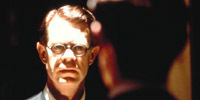
 |
Focus (2001) Directed by Neal Slavin Cast: William H. Macy, Laura Dern, Meat Loaf Aday, David Paymer, Kay Hawtrey, Michael Copeman 2001 – 107 minutes Rated: Reviewed by Dustin Putman, November 12, 2001.  Based on the 1945 novel by Arthur Miller, first-time director Neal Slavin's "Focus" is an ironic allegory about two Protestants living in a small town at the end of World War II who are increasingly harassed because they merely "look" Jewish. The premise is an ingenious one, and the film sometimes is quite effective in showing how narrow-minded prejudice and hatred can skyrocket over time if nothing is done to stop it. Kendrew Lascelles' heavy-handed screenplay puts a damper on the proceedings, however, turning what should be a believable tragedy into an obvious, far-fetched one.
Based on the 1945 novel by Arthur Miller, first-time director Neal Slavin's "Focus" is an ironic allegory about two Protestants living in a small town at the end of World War II who are increasingly harassed because they merely "look" Jewish. The premise is an ingenious one, and the film sometimes is quite effective in showing how narrow-minded prejudice and hatred can skyrocket over time if nothing is done to stop it. Kendrew Lascelles' heavy-handed screenplay puts a damper on the proceedings, however, turning what should be a believable tragedy into an obvious, far-fetched one.
Lawrence Newman (William H. Macy) is a low-key man who lives a quiet life with his fussy mother (Kay Hawtrey) until his boss instructs him to get glasses for his failing eyesight. Lawrence obediently gets a pair of black framed spectacles that inadvertently make him appear stereotypically Jewish (even though he isn't), setting off a chain of events that leave him without a job and chastised by his own neighborhood of anti-Semitic bigots. Things only get worse when he falls in love with, and marries, Gertrude (Laura Dern), a cautious woman who also happens to looks Jewish.  "Focus" is blessed with a thought-provoking plot that is so intriguing, it occasionally is able to overcome its shortfalls. The dire problems that Lawrence and Gertrude must face are frightening in their sheer nonsensicalness. Despite both being Protestant, they cannot seem to convince anyone around them, including their two-faced neighbor, Fred (Meat Loaf Aday), that they are anything other than what the close-knit community believes them to be. Their fears are perceptibly portrayed by Slavin's sure-footed direction, as well as the stirring music score by Mark Adler.
"Focus" is blessed with a thought-provoking plot that is so intriguing, it occasionally is able to overcome its shortfalls. The dire problems that Lawrence and Gertrude must face are frightening in their sheer nonsensicalness. Despite both being Protestant, they cannot seem to convince anyone around them, including their two-faced neighbor, Fred (Meat Loaf Aday), that they are anything other than what the close-knit community believes them to be. Their fears are perceptibly portrayed by Slavin's sure-footed direction, as well as the stirring music score by Mark Adler.
 William H. Macy gives yet another revelatory performance that can rank firmly beside his work in 1996's "Fargo" and 1999's "Magnolia." The devoted intensity of his acting meshes extremely well with his decision to underplay the quiet, somewhat passive role of Lawrence. You can always expect an interesting performance from Laura Dern (2001's "Jurassic Park III") no matter what the picture, and "Focus" is no exception. Unfortunately, Gertrude is presented as a somewhat shrill, stubborn woman who doesn't gain the viewer's sympathy quite the way she was clearly meant to. In the subtly evil supporting role of Fred, Meat Load Aday (1999's "Fight Club") superbly brings to life the malice hiding just underneath the surface of his chirpy, cheerful exterior.
William H. Macy gives yet another revelatory performance that can rank firmly beside his work in 1996's "Fargo" and 1999's "Magnolia." The devoted intensity of his acting meshes extremely well with his decision to underplay the quiet, somewhat passive role of Lawrence. You can always expect an interesting performance from Laura Dern (2001's "Jurassic Park III") no matter what the picture, and "Focus" is no exception. Unfortunately, Gertrude is presented as a somewhat shrill, stubborn woman who doesn't gain the viewer's sympathy quite the way she was clearly meant to. In the subtly evil supporting role of Fred, Meat Load Aday (1999's "Fight Club") superbly brings to life the malice hiding just underneath the surface of his chirpy, cheerful exterior.
Where "Focus" strays from the path is in the illogical developments of its story. The idea of two people being falsely branded as Jews in an unaccepting society is a provocative notion, but having the problem spout directly from Lawrence buying a certain pair of glasses isn't plausible. Furthermore, suspension of disbelief must be put into effect throughout, particularly as the whole town seemingly goes against him and Gertrude no matter how much proof points to their actual religious beliefs.  Aside from both having Jewish physical characteristics (which really aren't apparent at first glance), the film lacks a valid connection between Lawrence and Gertrude. During their first real date, we are led to believe that they not only fall in love, but start their wedding plans. Macy and Dern are not to blame, as they fulfill their parts more than admirably, but screenwriter Lescelles does a lackluster job in setting up their supposedly close and loving relationship. Since so much of the drama stems from the pitfalls they face as a couple, this flaw is a nearly catastrophic one.
Aside from both having Jewish physical characteristics (which really aren't apparent at first glance), the film lacks a valid connection between Lawrence and Gertrude. During their first real date, we are led to believe that they not only fall in love, but start their wedding plans. Macy and Dern are not to blame, as they fulfill their parts more than admirably, but screenwriter Lescelles does a lackluster job in setting up their supposedly close and loving relationship. Since so much of the drama stems from the pitfalls they face as a couple, this flaw is a nearly catastrophic one.
With racism still running rampant throughout our society, the serious-minded issues "Focus" deals with continue to be timely, but the treatment of the subject is too overbearingly cliched for its own good. As one dilemma after another is brought up, the film progressively loses its credibility, until there is very little left to support besides Macy's latest extraordinary turn. ©2001 by Dustin Putman |
 |













